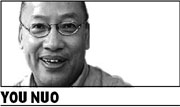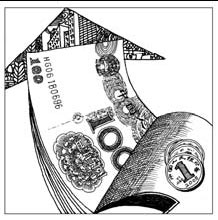This year will be the most difficult one for regional officials in China. As all provinces and cities are changing their top executive teams right now, all the new governors and mayors will have to learn to generate more growth by spending less.

Chinese officials have never had to learn that before. But if they do not take a crash course in public project finance, they will find it increasingly difficult to balance relations with the central government and with the local communities.
This is a time when the People's Bank of China, the central bank, has been ordered by the cabinet to tighten credit lines to avoid fueling inflation. This is a move China has not seen for the last decade.
Previously, whenever the government contracted the credit supply, the economy would experience more or less a slowdown in growth, as measured by GDP. Many regional projects would suffer from a temporary drain of finance and grind to a halt.
But this time a slowdown is the least thing China wants. The reality is that the economy has, due to global and internal reasons (the rising oil price and wages, for example), entered a high cost cycle, and the best thing to do to meet the change is to keep generating fast economic growth.
China could reap a much greater success than in an ordinary year if it can still stay on the fast track, while the year-end forecasts by many international organizations are indicating a more serious slowdown in the United States, Europe and Japan.
Between January and February, as all new governors and mayors take office, they will immediately face a situation their predecessors had probably never seen: The falling dollar (not just the rising yuan) has wiped out the profits of a whole generation of private enterprises in coastal regions in the last few months of 2007, the interior regions, though featuring lower general wages, are still not ready to replace the coastal enterprises.

Just a couple of days ago, the Chinese-language business media reported the collapse of the Shenzhen-based Bao Ji Co and the labor unrest that followed. Bao Ji was owned by a Hong Kong investor and claimed to be the No 1 Christmas tree maker in the world. But even as the largest in its industry, the company was crushed by rising material prices, wages, and the rising yuan against the dollar.
The Chinese manufacturer was making only 0.2 yuan (less than $0.02) per Christmas tree on the export market, according to the 21st Century Business Herald.
As international purchase orders are shifting away from China to other developing countries, China's new corporate tax law and new labor laws have both come into effect. They make foreign investment companies and corporate companies pay more tax and be more generous to their employees.
The impact of these laws on foreign direct investment and the private sector still cannot be fully assessed. It will take several months. What any cool-headed person can do in the meantime is to remain calm and see how things pan out. And perhaps, some small companies, those in the private sector for example, could opt for winding down their businesses.
The collapse of the Christmas tree manufacturer illustrates the necessity for China's new provincial governors and city mayors to take prompt action to prevent the sudden change in market conditions from hurting more people.
How can they, with less money from Beijing, manage to help local markets keep flourishing? How can they avoid spending money on wasteful and pollutant industrial projects while creating more benefits for the local communities? There do not seem to be ready answers to these questions.
E-mail: younuo@chinadaily.com.cn
(China Daily 01/07/2008 page4)

